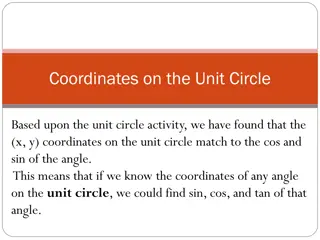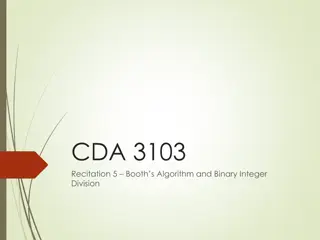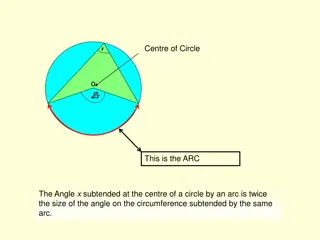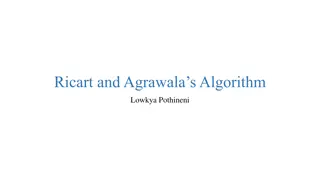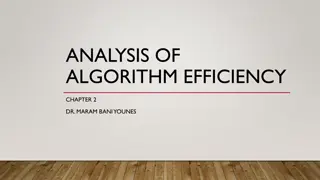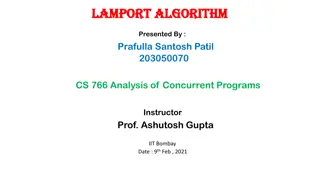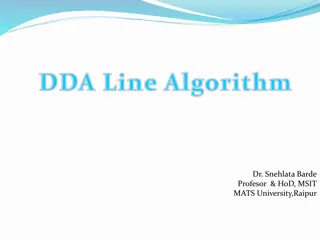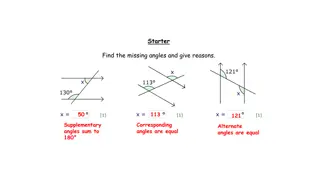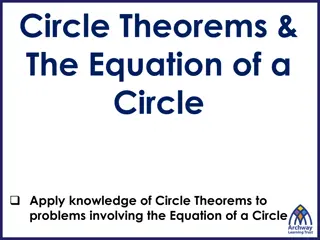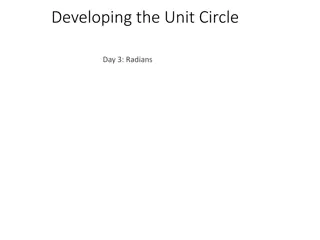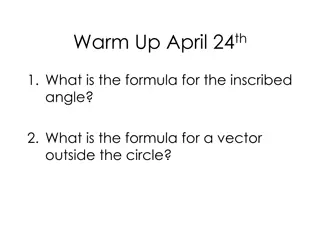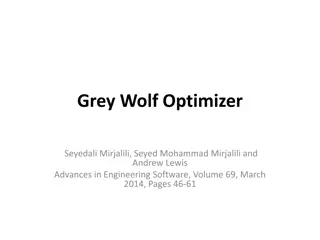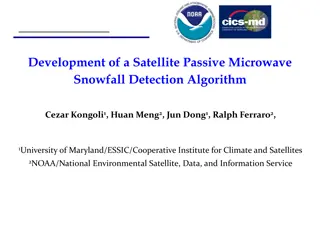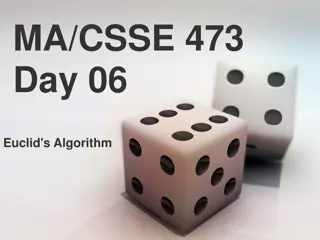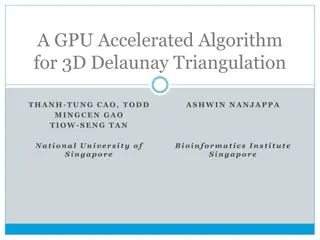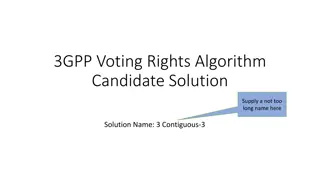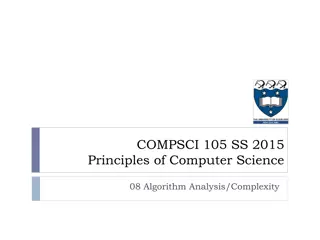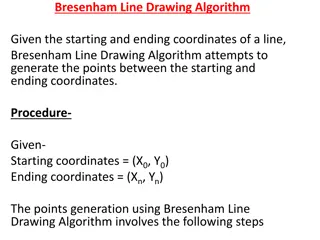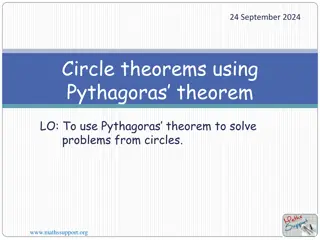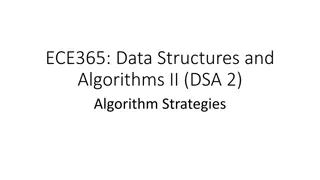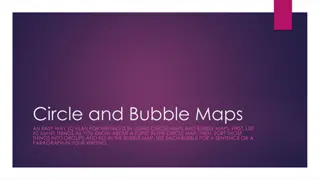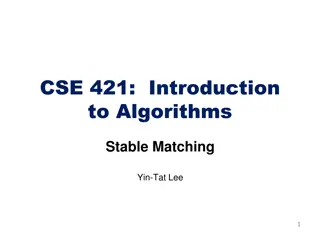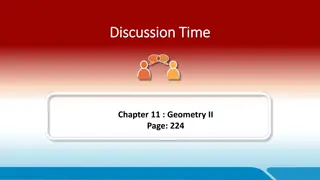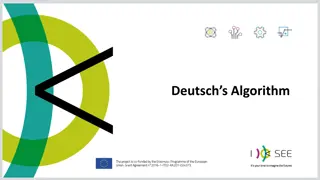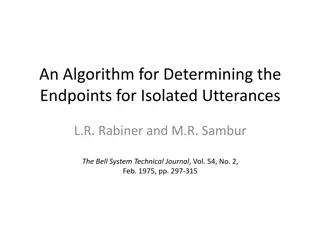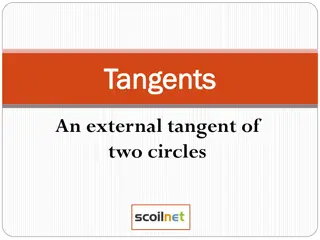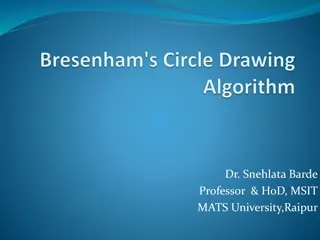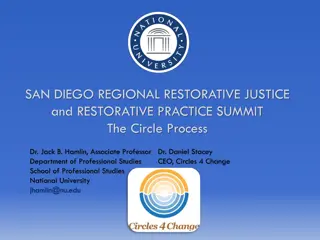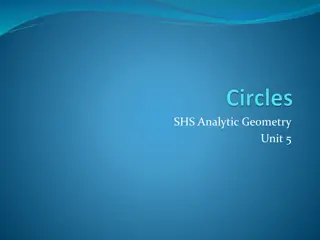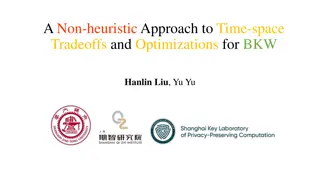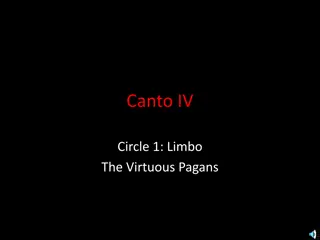Algorithm Analysis
Algorithm analysis involves evaluating the efficiency of algorithms through measures such as time and memory complexity. This analysis helps in comparing different algorithms, understanding how time scales with input size, and predicting performance as input size approaches infinity. Scaling analysi
1 views • 30 slides
Clinical Algorithm for Rash Evaluation
The clinical algorithm outlines the evaluation process for a patient presenting with a rash, focusing on the assessment for measles transmission. It covers key criteria, testing recommendations, and guidelines for suspected measles cases. Healthcare providers can utilize this algorithm to determine
0 views • 5 slides
Advanced Cardiovascular Life Support Algorithm
This advanced cardiovascular life support algorithm provides step-by-step guidance in managing cardiac emergencies such as cardiac arrest, arrhythmias, and other life-threatening conditions. The algorithm includes a series of slides detailing important procedures and interventions to improve patient
5 views • 9 slides
Coordinates on the Unit Circle
Exploring how the coordinates on the unit circle correspond to trigonometric functions like sine, cosine, and tangent. Learn how to find these values for angles on the unit circle and how to apply trigonometry principles when points are not on the unit circle.
9 views • 6 slides
Understanding Booth's Algorithm for Binary Integer Division
Learn about Booth's Algorithm and how it facilitates binary integer division. Discover key points to remember when using the algorithm, steps to initiate the process, and a detailed example to illustrate the multiplication of two operands using Booth's Algorithm.
0 views • 42 slides
Understanding Circle Geometry Principles
Explore key concepts in circle geometry such as angles subtended at the center and circumference, cyclic quadrilaterals, properties of tangents and chords, and the significance of major and minor segments. Uncover relationships between angles, segments, and points on a circle, including alternate se
2 views • 8 slides
Understanding Stable Matchings and the Gale-Shapley Algorithm
The concept of stable matchings is explored, along with the Gale-Shapley algorithm for finding them efficiently. Key ideas and steps of the algorithm are explained, supported by visuals. The process, examples, and observations related to the algorithm's effectiveness are discussed, highlighting the
1 views • 29 slides
Ricart and Agrawala's Algorithm for Mutual Exclusion
The Ricart-Agrawala Algorithm is a distributed system algorithm for achieving mutual exclusion without the need for release messages, developed by Glenn Ricart and Ashok Agrawala. The algorithm involves processes sending timestamped requests to enter a critical section, with careful handling of repl
1 views • 16 slides
Understanding Algorithm Efficiency Analysis
In this chapter, Dr. Maram Bani Younes delves into the analysis of algorithm efficiency, focusing on aspects such as order of growth, best case scenarios, and empirical analysis of time efficiency. The dimensions of generality, simplicity, time efficiency, and space efficiency are explored, with a d
1 views • 28 slides
Understanding Lamport Algorithm for Mutual Exclusion
Lamport Algorithm, presented by Prafulla Santosh Patil, is a permission-based algorithm utilizing timestamps to order critical section requests and resolve conflicts. It employs three types of messages: REQUEST, REPLY, and RELEASE, where each site manages a queue to store requests. By ensuring commu
0 views • 15 slides
Digital Differential Analyzer (DDA) Algorithm in Computer Graphics
In computer graphics, the Digital Differential Analyzer (DDA) Algorithm is utilized as the basic line drawing algorithm. This method involves interpolation of variables between two endpoints to rasterize lines, triangles, and polygons efficiently. The algorithm requires inputting coordinates of two
0 views • 9 slides
Geometry Investigations and Theorems
Explore various circle theorems and investigations involving angles, tangents, radii, and circumferences. Discover the relationships between angles at the center and circumference, the properties of tangents, and the angle measurements within a circle. Engage in investigations to understand the sign
6 views • 26 slides
Understanding Circle Theorems and Equations of Circles
Explore circle theorems and equations of circles in geometry, including concepts like opposite angles in cyclic quadrilaterals, angles on a straight line, and important theorems like the perpendicular bisector of a chord passing through the center of a circle. Learn how to apply these theorems to fi
0 views • 12 slides
Understanding Radians: Developing Unit Circle Skills
Exploring radians as a unit of angle measurement and honing unit circle skills through practical examples. Learn how to evaluate angles using the unit circle effectively. Dive into the fundamentals of central angles and their relationship to the radius of a circle for a comprehensive understanding o
0 views • 7 slides
Circles: Formulas for Inscribed Angles and Circumference
Explore the formulas for inscribed angles, vectors outside the circle, and the circumference of a circle. Learn how to calculate the circumference using radius, diameter, or directly measure the arc length. Discover the relationship between arc length and the angle measure in a circle.
1 views • 25 slides
Grey Wolf Optimizer: A Nature-Inspired Optimization Algorithm
The Grey Wolf Optimizer algorithm is based on the social hierarchy of grey wolves in the wild. Inspired by the pack behavior of grey wolves, this algorithm utilizes alpha, beta, and delta solutions to guide the optimization process. The hunting phases of tracking, pursuing, and attacking prey mimic
3 views • 16 slides
Emergency Paediatric Tracheostomy Management Algorithm
Emergency Paediatric Tracheostomy Management Algorithm provides a structured approach for managing pediatric patients requiring tracheostomy in emergency situations. The algorithm outlines steps for assessing airway patency, performing suction, and changing the tracheostomy tube if necessary. It emp
0 views • 4 slides
Development of Satellite Passive Microwave Snowfall Detection Algorithm
This study focuses on the development of a satellite passive microwave snowfall detection algorithm, highlighting the challenges in accurately determining snowfall using satellite instruments. The algorithm uses data from AMSU/MHS, ATMS, and SSMIS sensors to generate snowfall rate estimates, overcom
0 views • 20 slides
Understanding Euclid's Algorithm: An Ancient Approach to Finding Greatest Common Divisors
Euclid's Algorithm, dating back 2500 years, offers a simpler method to find the greatest common divisor (gcd) of two non-negative integers compared to traditional factorization. By iteratively applying a rule based on the gcd of remainders, it efficiently computes gcd values. The basis of the algori
0 views • 15 slides
GPU Accelerated Algorithm for 3D Delaunay Triangulation
Thanh-Tung Cao, Todd Mingcen Gao, Tiow-Seng Tan, and Ashwin Nanjappa from the National University of Singapore's Bioinformatics Institute present a GPU-accelerated algorithm for 3D Delaunay triangulation. Their work explores the background, related works, algorithm implementation, and results of thi
0 views • 24 slides
Cuckoo Search: A Nature-Inspired Optimization Algorithm
Cuckoo Search (CS) algorithm, developed in 2009, mimics the brood parasitism of cuckoo species and utilizes Lévy flights for efficient optimization. This algorithm has shown promise in outperforming other traditional methods like PSO and genetic algorithms. The behavior of cuckoos in laying eggs an
0 views • 25 slides
Understanding Circle Parts and Measurements
Explore the different parts of a circle, such as circumference, radius, and diameter, and understand their relationships. Engage in activities to compare lengths of different parts using string. Learn how to draw a circle accurately and deepen your knowledge of geometric concepts.
0 views • 13 slides
Ford-Fulkerson Algorithm for Maximum Flow in Networks
The Ford-Fulkerson algorithm is used to find the maximum flow in a network by iteratively pushing flow along paths and updating residual capacities until no more augmenting paths are found. This algorithm is crucial for solving flow network problems, such as finding min-cuts and max-flow. By modelin
0 views • 26 slides
3GPP Voting Rights Algorithm: Contiguous-3 Solution Evaluation
This evaluation delves into the advantages and disadvantages of the 3 Contiguous-3 solution within the 3GPP voting rights algorithm. It explores scenarios to test the algorithm's effectiveness in granting and revoking voting rights based on meeting attendance types. The evaluation includes diverse h
0 views • 10 slides
Introduction to Algorithm Analysis and Complexity in Computer Science
Algorithm analysis is crucial in determining the efficiency of programs by analyzing resource usage such as time and space. This involves comparing programs, understanding data structures, and evaluating algorithm performance. Efficiency is key as program execution time depends on various factors be
0 views • 66 slides
Bresenham Line Drawing Algorithm Explained with Examples
Bresenham Line Drawing Algorithm is a method used to generate points between starting and ending coordinates to draw lines efficiently. This algorithm involves calculating parameters, decision parameters, and iteratively finding points along the line. Two example problems are provided with step-by-s
0 views • 8 slides
Understanding Circle Theorems and Pythagoras Theorem in Geometry
Explore the key concepts of circle theorems and Pythagoras theorem in geometry. Learn about the parts of a circle, properties of chords, the relationship between the radius and tangent, and how Pythagoras theorem can be applied to solve circle-related problems like finding distances and lengths. Eng
0 views • 8 slides
Algorithm Strategies: Greedy Algorithms and the Coin-changing Problem
This topic delves into general algorithm strategies, focusing on the concept of greedy algorithms where locally optimal choices are made with the hope of finding a globally optimal solution. The discussion includes the nature of greedy algorithms, examples such as Dijkstra's algorithm and Prim's alg
0 views • 91 slides
Effective Writing Planning with Circle and Bubble Maps
Utilize circle and bubble maps as tools for organizing writing ideas effectively. Begin by listing key points on a circle map and then categorize and elaborate on them in a bubble map. Each bubble can represent a sentence or paragraph in your writing. Finally, use the mapped information to craft a w
0 views • 7 slides
Circle Circumference & Perimeter Demonstration
This resource features animated demonstrations explaining the mathematical methods related to the circumference and perimeter of a circle. It includes visual representations and explanations of the relationship between a circle's circumference and diameter using the value of pi (π). Viewers can eas
0 views • 16 slides
Stable Matching Problem and Gale-Shapley Algorithm Overview
The content provides information on the stable matching problem and the Gale-Shapley algorithm. It covers the definition of stable matching, the workings of the Gale-Shapley algorithm, tips for algorithm implementation, and common questions related to the topic. The content also includes a summary o
0 views • 16 slides
Geometry II - Understanding Lines and Arcs in a Circle
This content discusses concepts related to geometry, focusing on lines and arcs within a circle. It explores the properties of lines AB and APB, measures of angles AOB and APB, as well as the shapes formed within the circle. The discussion provides a clear understanding of the terminology and geomet
0 views • 4 slides
Understanding Deutsch's Algorithm in Quantum Computing
Deutsch's Algorithm is a fundamental quantum algorithm designed to solve the problem of determining if a given function is constant or balanced. This algorithm leverages quantum principles such as superposition and entanglement to provide a more efficient solution compared to classical methods. By e
0 views • 17 slides
Algorithm for Determining Endpoints in Speech Recognition
This article discusses an algorithm proposed by L.R. Rabiner and M.R. Sambur in 1975 for determining endpoints in isolated utterances. The algorithm focuses on detecting word boundaries in speech through the recognition of silence, which can lead to reduced processing load and increased convenience,
0 views • 22 slides
Exploring External Tangents of Circles
Discover the construction process of external tangents between two circles, starting from identifying the smaller circle's radius to bisecting lines connecting the point to the circle. Learn how to construct a semi-circle with specified diameters and more.
0 views • 20 slides
Bresenham's Circle Drawing Algorithm Explained
Bresenham's Circle drawing algorithm is a fast and efficient method for drawing circles using integer arithmetic. It divides the circle into octants and selects the nearest pixel positions to create smooth arcs. This algorithm is widely used for graphics applications due to its speed and accuracy.
0 views • 15 slides
Restorative Justice & Practice Summit: Exploring Circle Process and Core Values
The San Diego Regional Restorative Justice and Restorative Practice Summit focuses on the Circle Process, led by experts Dr. Jack B. Hamlin and Dr. Daniel Stacey. Explore the essence of connection, core values, and building safe spaces for re-connection. Delve into universal and Circle values, along
0 views • 10 slides
Understanding Circles in Analytic Geometry
Explore the fundamentals of circles in analytic geometry by learning how to derive circle formulas, equation determination, completing the square, proving circle properties, and solving application problems. Discover the definition of a circle, its relation to triangles, and the terms, equations, an
0 views • 51 slides
Time-space Tradeoffs and Optimizations in BKW Algorithm
Time-space tradeoffs and optimizations play a crucial role in the BKW algorithm, particularly in scenarios like learning parity with noise (LPN) and BKW algorithm iterations. The non-heuristic approach in addressing these tradeoffs is discussed in relation to the hardness of the LPN problem and the
0 views • 14 slides
Journey Through Dante's Inferno: Circle 1 - Limbo and the Virtuous Pagans
Dante descends into the first circle of Hell, known as Limbo, where he encounters the Virtuous Pagans - those who were born before Christianity or not baptized. Among them is the great poet Virgil, who explains their fate of living without hope. This circle holds esteemed figures like Homer, Plato,
0 views • 9 slides



